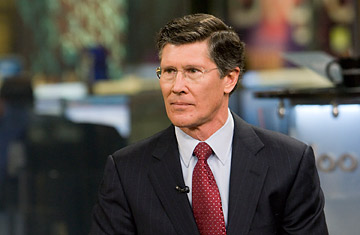
John Thain, former CEO of Merrill Lynch
The bull is breathing all over Wall Street.
A little more than a year after Merrill Lynch was officially swallowed by Bank of America, many of the executives of the once storied Wall Street firm — which used the animal that is synonymous with rising stock markets as its mascot — have landed in leadership positions around the financial world.
On Monday, John Thain, who was Merrill's chief executive when the firm sold to BofA, got the top job at troubled lender CIT. Thain said he was interested in the opportunity to revitalize the small-business lender. "CIT can and will serve an important role in the recovery of the U.S. economy and the creation of jobs," Thain told reporters.
It's typical for executives to leave their firm after it has been acquired. But Bank of America's acquisition of Merrill Lynch has turned out to be a recruiting bonanza for other Wall Street firms. In December, Morgan Stanley hired former Merrill president Gregory Fleming to head the firm's investment-management division. Another top former Merrill executive, Bob McCann, was picked to run the wealth-management division of Swiss bank UBS, which has more than 8,000 brokers.
"I think it is a testimony to the quality of senior management at Merrill," says Gary Goldstein, a top Wall Street recruiter. "A good number of them have landed on their feet, and not been stigmatized by the actions of a few people."
Bank of America says it doesn't know what percentage of Merrill Lynch's employees remain at the bank, though many have stayed. Thomas Montag, who runs the corporate and investment-banking operations of BofA, is from Merrill Lynch.
Shortly after the financial crisis, many predicted that employees of firms that either failed or nearly failed would have a hard time finding work on Wall Street, given the poor economic conditions and the stigma of their previous employer. What's more, news that Merrill Lynch had paid out big bonuses despite huge losses on the eve of being bought out by BofA made the investment bank and its executives in early 2009 the poster children for bad behavior on Wall Street.
But the recent rebound in profits of financial firms has restarted the Wall Street hiring machine. And former executives from the firms that stumbled in the financial crisis are turning out to be hot commodities. Merrill Lynch is not alone. The failures of Lehman Brothers and Bear Stearns have produced hunting grounds for other firms as well. But either because Merrill was a larger firm or because it didn't have as big a role in sparking the credit crisis as Lehman or Bear, it seems that no firm on Wall Street these days is without a former top executive from Merrill Lynch.
At Citigroup, Eugene McQuade is running the bank's North American retail-banking operations. McQuade was formerly the head of Merrill's banking operations — a considerably smaller job than the one he has at Citi. Investment banks Jefferies and recent upstart Moelis & Co. have also picked up former top Merrill Lynch bankers.
Perhaps the feeling of family that used to be felt at the firm formerly nicknamed "Mother Merrill" is the strongest at Deutsche Bank. The German financial-services firm has hired more than a dozen Merrill Lynch bankers, including brothers David, Eric and Seth Heaton. Eric Heaton used to be the treasurer of Merrill Lynch. Many of the other bankers that Deutsche hired were in Merrill's financial-institutions group, which provided underwriting and mergers-and-acquisition advice to other banks and asset-management and insurance firms.
Ironically, despite their being at a firm that needed a lifeline at the height of the financial crisis, many former Merrill Lynch executives have ended up in what most of us would consider to be lucrative jobs. Last June, top Merrill Lynch investment banker George Young was hired by Lazard to be a vice chairman of its U.S. investment bank. Lazard paid its employees an average of $505,000 in 2009, slightly more than Goldman Sachs. Young, most likely, got considerably more. Thain, for his new job, will be getting an annual salary of $6 million, of which $500,000 will be in cash and the rest in restricted stock.
